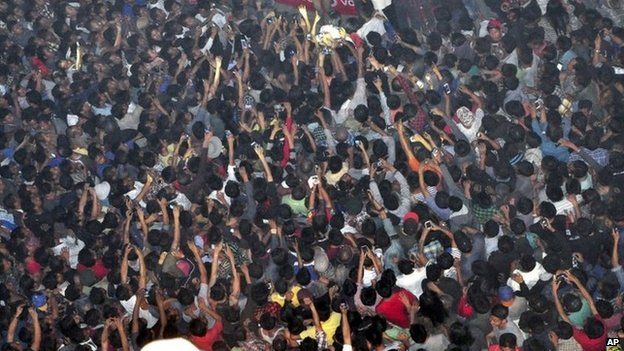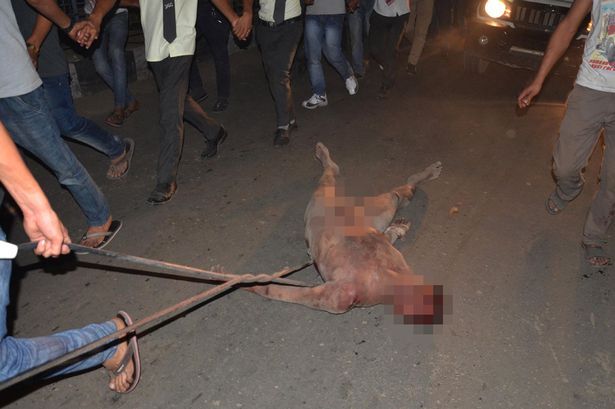 Hundreds of people dragged the suspect through the streets of Dimapur.Police in north-eastern India say they have charged 42 people in connection with the lynching of a suspected rapist who was taken from prison by a mob.
Hundreds of people dragged the suspect through the streets of Dimapur.Police in north-eastern India say they have charged 42 people in connection with the lynching of a suspected rapist who was taken from prison by a mob.
The man, identified as Syed Sharif Khan, was stripped naked, beaten and dragged through Dimapur, Nagaland state's main city, before being hanged.
Hundreds of policemen have been patrolling the streets of Dimapur since the incident amid increasing tension.
A curfew was also imposed in the city on Sunday to maintain law and order.
In earlier reports, police named the dead man as Farid Khan, but his family told the BBC his name was Syed Sharif Khan.
Police said Mr Khan was a Bengali-speaking Muslim trader from the neighbouring state of Assam. He was arrested in February on charges of raping a 19-year-old tribal woman three times.
 The man, identified as Syed Sharif Khan, was stripped naked, beaten and dragged through Dimapur, Nagaland state's main city, before being hanged.Mr Khan's brother said he was picked on because of ethnic reasons. According to reports, the woman was related to Mr Khan by marriage.
The man, identified as Syed Sharif Khan, was stripped naked, beaten and dragged through Dimapur, Nagaland state's main city, before being hanged.Mr Khan's brother said he was picked on because of ethnic reasons. According to reports, the woman was related to Mr Khan by marriage.
After Mr Khan was taken from prison on Thursday, he was dragged through the streets by thousands of people. Police opened fire to try to stop the mob, wounding several people.
On Monday, police said the arrested men had been charged with rioting, arson and unlawful assembly.
"Some of these 42 arrested men were also directly involved in the lynching, and will face additional charges," news agency AFP quoted Inspector General of Police Wabang Jamir as saying.
There are conflicting versions of how a large mob entered the prison and then removed - and killed - one selected inmate.
One version is that initially a small group of men went to the prison, and demanded to take out Mr Khan, and that some prison officials complied and led them to him.
Only later, several thousand people collected outside the jail, demanding that the prisoner be handed over to them.
The lynching happened in the midst of a controversy in India over the government's decision to ban India's Daughter, a documentary about the 2012 gang rape and murder of a student in Delhi.
But correspondents say the killing is also linked to rising ethnic tensions in Nagaland, whose indigenous tribespeople have blamed migrants from Assam state and Bangladesh for settling on their land.
Vigilante justice is not unheard of in India but it is rarely seen on this scale.
Source: bbc.com
 В Атырау -10
В Атырау -10